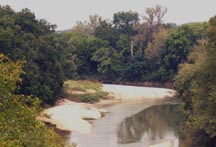If a River Runs Through It, What Law Applies?
 It
may start with a call from a deputy sheriff or the local game warden: "I just
handled a trespass call from a landowner on the river. He wanted me to arrest
a fisherman, or at least run him off. But the fisherman insisted that he had
a right to be there, and wanted me to arrest the landowner. I ID'd them both,
the fisherman moved on, and I left to talk to you." Or it may be a canoeist
who wants to report that a fence has been erected in the river, and is a hazard
to navigation. Or it may be a lakeside landowner, worried about vandalism and
theft, who doesn't want fishermen coming around his dock in their boats.
It
may start with a call from a deputy sheriff or the local game warden: "I just
handled a trespass call from a landowner on the river. He wanted me to arrest
a fisherman, or at least run him off. But the fisherman insisted that he had
a right to be there, and wanted me to arrest the landowner. I ID'd them both,
the fisherman moved on, and I left to talk to you." Or it may be a canoeist
who wants to report that a fence has been erected in the river, and is a hazard
to navigation. Or it may be a lakeside landowner, worried about vandalism and
theft, who doesn't want fishermen coming around his dock in their boats.
Many prosecutors will eventually face questions like these, only to learn that they are often much more complex than they look. This article is an attempt to give you some working knowledge of the basic issues, and dispel some of the common misconceptions.
Along the way, you will see many citations to civil cases. The criminal offenses implicated here (trespass, sportsman harassment, obstructing a waterway, and hunting/fishing without landowner consent) often turn on whether or not the defendant (or complainant) had legal authority to be there. The civil cases are valuable because they help answer that question.
Article Contents
About this Paper
by: Boyd Kennedy; Staff Attorney, Texas Parks and Wildlife Department*
Reprinted from the July/August 2002 issue of the Texas Prosecutor
with permission of the Texas District & County Attorneys Association (Revised June 2007)
* This article does not represent official views of Texas Parks And Wildlife Department, and is not intended as legal advice.